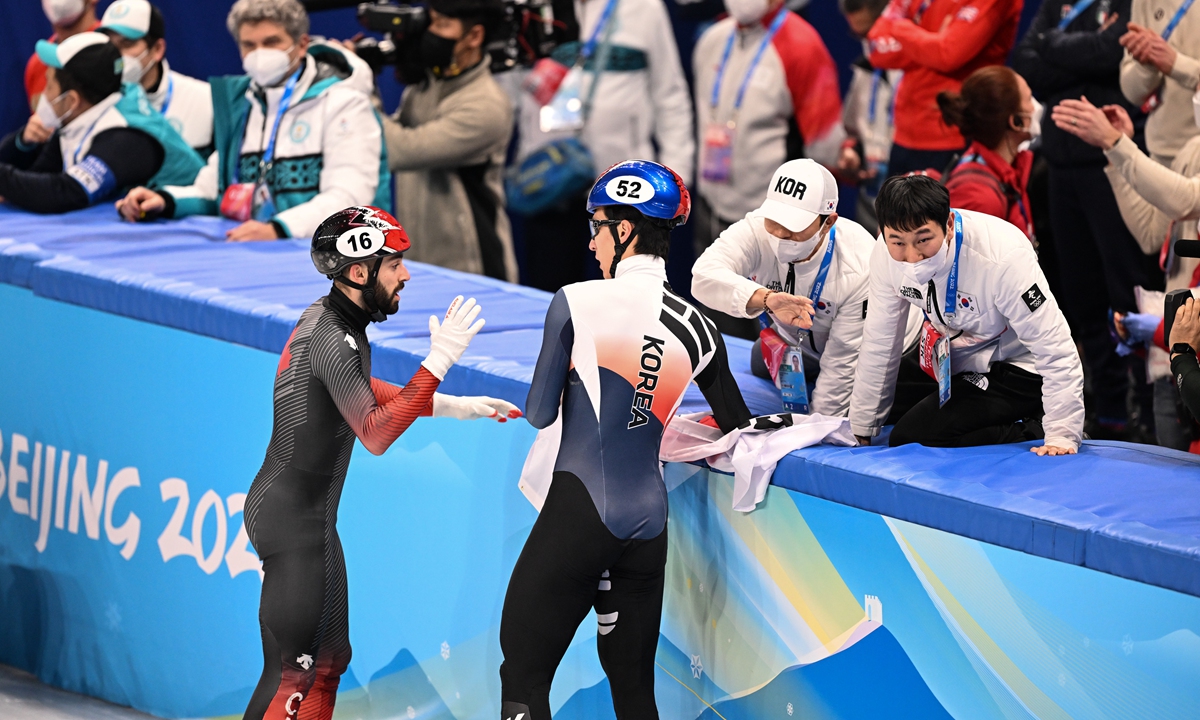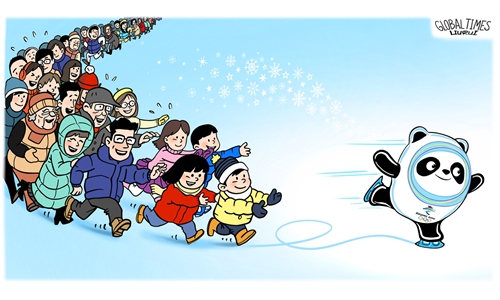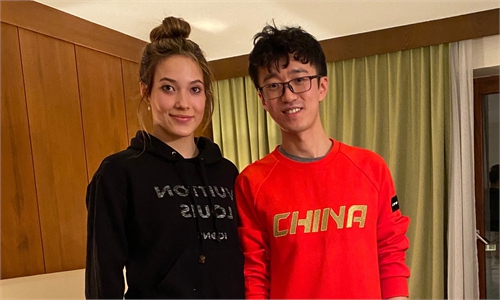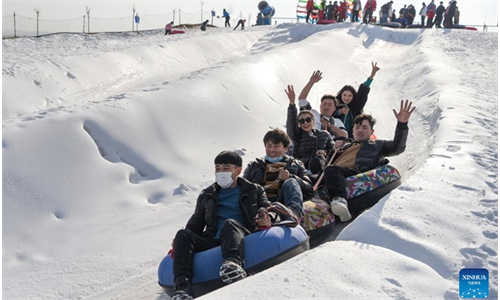
Skater Hwang Dae-heon wins South Korea's first gold medal at the Beijing 2022 Winter Olympic Games in the men's 1,500 meters short track event. Photo: cnsphoto
China and South Korea are calling to strengthen exchanges to defuse the confrontational sentiment of some netizens on the latest controversies which exploded after some of the short-track speed skating events at the Beijing 2022 Winter Olympics, as experts pointed out that some South Korean politicians should stop their irrational hyping of anti-China sentiment but take more positive actions to promote relations as the two countries are embracing the 30th anniversary of the establishment of bilateral relations this year.
The Chinese Embassy in South Korea on Thursday congratulated skater Hwang Dae-heon for winning South Korea's first gold medal at the Beijing 2022 Winter Olympic Games in the men's 1,500 meters short track event.
The true charm of the Olympics is not only the "faster, higher, stronger" competitive level it presents, but the spirit of "togetherness" it carries, the spokesperson of the Chinese Embassy said in a release on Thursday, wishing Chinese and South Korean athletes more achievements at the Beijing 2022.
This came after a fierce controversy between Chinese and South Korean netizens over Hwang and another South Korean skater Lee June-seo being disqualified in the semifinals of the 1,000 meters on Monday.
Echoing the Chinese Embassy's efforts to defuse the controversy and responding to questions on how to strengthen relations with China, South Korean President Moon Jae-in said in a joint written interview with Yonhap News Agency and seven other global news agencies on Thursday that communication plays a crucial role in bilateral relations and "we should continue to push for a forward-looking, mature strategic partnership while further revitalizing exchanges and cooperation in wide-ranging areas."
This year marks the 30th anniversary of the establishment of China-South Korea diplomatic ties. Analysts called for more positive actions to promote bilateral relations.
Online verbal battles between Chinese and South Korean netizens have escalated in recent days centering on the short track speed staking controversies and other topics.
After Hwang and Lee were disqualified for rule violations on Monday, Chinese athletes Ren Ziwei and Li Wenlong went on to win gold and silver in the event.
South Korea has been a power house in short-track speed skating, so the failure to win medals after the disqualifications disappointed the South Korean team as well as the netizens.
As Korean Sport and Olympic Committee's announced on Tuesday it was filing protests over the disqualifications with the Court of Arbitration for Sport and the International Olympic Committee, many South Korean netizens vented their anger at Chinese athletes and Victor An, also known as Ahn Hyun-soo, who is a retired South Korean-born Russian short-track speed skater and who joined the coaching staff for China's national short track team in 2020.
It is common to see disputes over penalties in short-track speed skating events as it is so fast and competitive. Teams can appeal over judge's decisions in accordance with the rules if they think it necessary. But some South Korean netizens' negative responses are somewhat irrational and some politicians are hyping anti-China sentiment to win more votes in this election period, Lü Chao, an expert on the Korean Peninsula issue at the Liaoning Academy of Social Sciences, told the Global Times.
Some South Korean politicians accused China of "cultural appropriation" after a representative of China's Korean ethnicity
wore the hanbok, Korean traditional dress, during the opening ceremony of the Beijing Olympics on February 4.
South Korean ruling party lawmaker Lee So-young wrote on her Facebook page on Saturday that this is not the first time China has "introduced Korean culture as if it were its own."
In response, the Chinese Embassy also released a statement on Thursday, saying that the accusation of "cultural appropriation" is groundless. All ethnic groups in China have the right to wear their traditional clothes. China's ethnic Koreans share the same origin with Koreans living in the Korean Peninsula as well as the same traditional cultures and clothes.
Some countries and Western media are exploiting the opportunity to sow discord between public of China and South Korea, analysts said.
For example, the top US diplomat currently in Seoul, Chargé d'Affaires Christopher Del Corso tweeted on Tuesday that "What comes to mind when you think of Korea? Kimchi, K-Pop, K-dramas ... and of course Hanbok #OriginalHanbokFromKorea." His move was criticized by some netizens as "adding fuel to the fire."
Some analysts noted that nationalism and confidence have been mixed among some South Koreans due to rapid economic development while regional geopolitics as well as the reliance on the US for security upset them. Some shift this sentiment toward China which is why minor incidents sometimes escalate.
In January 2021, netizens from China and South Korea engaged in debates over where "kimchi," a cold pickled cabbage dish called paocai in China originated. The Chinese Foreign Ministry spokesperson Hua Chunying later said that it is a pickled and fermented dish not exclusively owned by certain countries and regions and called for friendly and unbiased exchanges on food.
However, despite heated war of words, there are always more voices in China and South Korea calling for rational discussions. For example, aside from the Chinese Embassy's congratulations to Hwang, many Chinese netizens also applauded Hwang's excellent performance during Wednesday competition.
China and South Korea have maintained close exchanges between governments and top leaders as well as on trade and economies for the past decades.
These incidents remind us to promote people-to-people exchanges to dispel misunderstandings among the peoples before bilateral relations are affected, Da Zhigang, director and research fellow of the Institute of Northeast Asian Studies at Heilongjiang Provincial Academy of Social Sciences and chief expert at the Northeast Asian Strategic Studies Institute, told the Global Times.
Da noted that China and South Korea have supported each other on many issues, especially those concerning Northeast Asia. China-South Korea relations should not be ruined by minor incidents - this is the consensus reached by people from the fields of politics, economy and scholars in China and South Korea.
"China and South Korea share such close relations in geography and history and trade, and we have a better basis and stronger potentials in further promoting our friendliness. For the future, we should focus on cooperation rather than differences to deepen exchanges in all fields," Da said.




